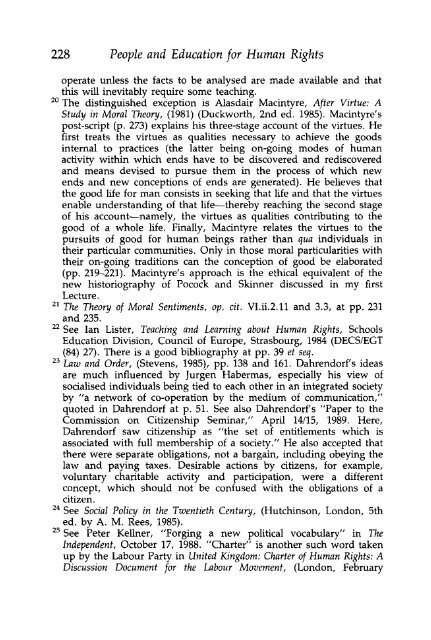The United Kingdom and Human Rights - College of Social ...
The United Kingdom and Human Rights - College of Social ...
The United Kingdom and Human Rights - College of Social ...
You also want an ePaper? Increase the reach of your titles
YUMPU automatically turns print PDFs into web optimized ePapers that Google loves.
228 People <strong>and</strong> Education for <strong>Human</strong> <strong>Rights</strong><br />
operate unless the facts to be analysed are made available <strong>and</strong> that<br />
this will inevitably require some teaching.<br />
20 <strong>The</strong> distinguished exception is Alasdair Macintyre, After Virtue: A<br />
Study in Moral <strong>The</strong>ory, (1981) (Duckworth, 2nd ed. 1985). Macintyre's<br />
post-script (p. 273) explains his three-stage account <strong>of</strong> the virtues. He<br />
first treats the virtues as qualities necessary to achieve the goods<br />
internal to practices (the latter being on-going modes <strong>of</strong> human<br />
activity within which ends have to be discovered <strong>and</strong> rediscovered<br />
<strong>and</strong> means devised to pursue them in the process <strong>of</strong> which new<br />
ends <strong>and</strong> new conceptions <strong>of</strong> ends are generated). He believes that<br />
the good life for man consists in seeking that life <strong>and</strong> that the virtues<br />
enable underst<strong>and</strong>ing <strong>of</strong> that life—thereby reaching the second stage<br />
<strong>of</strong> his account—namely, the virtues as qualities contributing to the<br />
good <strong>of</strong> a whole life. Finally, Macintyre relates the virtues to the<br />
pursuits <strong>of</strong> good for human beings rather than qua individuals in<br />
their particular communities. Only in those moral particularities with<br />
their on-going traditions can the conception <strong>of</strong> good be elaborated<br />
(pp. 219-221). Macintyre's approach is the ethical equivalent <strong>of</strong> the<br />
new historiography <strong>of</strong> Pocock <strong>and</strong> Skinner discussed in my first<br />
Lecture.<br />
21 <strong>The</strong> <strong>The</strong>ory <strong>of</strong> Moral Sentiments, op. cit. VI.ii.2.11 <strong>and</strong> 3.3, at pp. 231<br />
<strong>and</strong> 235.<br />
22 See Ian Lister, Teaching <strong>and</strong> Learning about <strong>Human</strong> <strong>Rights</strong>, Schools<br />
Education Division, Council <strong>of</strong> Europe, Strasbourg, 1984 (DECS/EGT<br />
(84) 27). <strong>The</strong>re is a good bibliography at pp. 39 et seq.<br />
23 Law <strong>and</strong> Order, (Stevens, 1985), pp. 138 <strong>and</strong> 161. Dahrendorf's ideas<br />
are much influenced by Jurgen Habermas, especially his view <strong>of</strong><br />
socialised individuals being tied to each other in an integrated society<br />
by "a network <strong>of</strong> co-operation by the medium <strong>of</strong> communication,"<br />
quoted in Dahrendorf at p. 51. See also Dahrendorf's "Paper to the<br />
Commission on Citizenship Seminar," April 14/15, 1989. Here,<br />
Dahrendorf saw citizenship as "the set <strong>of</strong> entitlements which is<br />
associated with full membership <strong>of</strong> a society." He also accepted that<br />
there were separate obligations, not a bargain, including obeying the<br />
law <strong>and</strong> paying taxes. Desirable actions by citizens, for example,<br />
voluntary charitable activity <strong>and</strong> participation, were a different<br />
concept, which should not be confused with the obligations <strong>of</strong> a<br />
citizen.<br />
24 See <strong>Social</strong> Policy in the Twentieth Century, (Hutchinson, London, 5th<br />
ed. by A. M. Rees, 1985).<br />
25 See Peter Kellner, "Forging a new political vocabulary" in <strong>The</strong><br />
Independent, October 17, 1988. "Charter" is another such word taken<br />
up by the Labour Party in <strong>United</strong> <strong>Kingdom</strong>: Charter <strong>of</strong> <strong>Human</strong> <strong>Rights</strong>: A<br />
Discussion Document for the Labour Movement, (London, February

















